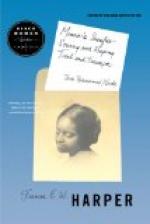Chapter XI
It has been quite a length of time since we left Mr. Thomas and his young friend facing an uncertain future. Since then he has not only been successful in building up a good business for himself, but in opening the gates to others. His success has not inflated him with pride. Neither has he become self-abashed and isolated from others less fortunate, who need his counsel and sympathy. Generous and noble in his character, he was conservative enough to cling to the good of the past and radical enough to give hospitality to every new idea which was calculated to benefit and make life noble and better. Mr. Thomas, in laying the foundation of his education, was thoughtful enough to enter a manual labor school, where he had the double advantage of getting an education and learning a trade, through which he was enabled to rely on himself without asking aid from any one, which in itself was an education in manliness, self-respect and self-reliance, that he could not have obtained had he been the protege of the wealthiest philanthropist in the land. As he had fine mechanical skill and ingenuity, he became an excellent carpenter. But it is one thing to have a trade and another thing to have an opportunity to exercise that trade. It was a time when a number of colored churches were being erected. To build large and even magnificent churches seemed to be a ruling passion with the colored people. Their homes might be very humble, their walls bare of pictured grace, but by united efforts they could erect large and handsome churches in which they had a common possession and it was one of the grand satisfactions of freedom that they were enabled to build their own churches and carry on their own business without being interfered with, and overlooked by a class of white ecclesiastics whose presence was a reminder of their implied inferiority. The church of which Mr. Thomas was a member was about to erect a costly edifice. The trustees would probably have willingly put the work in the hands of a colored man, had there been a sufficient number to have done the work, but they did not seem to remember that white prejudice had barred the Northern workshops against the colored man, that slavery, by degrading and monopolizing labor had been the means of educating colored men in the South to be good mechanics, and that a little pains and search on their part might have brought to light colored carpenters in the South who would have done the work as efficiently as those whom they employed, but as the trustees were not very farsighted men, they did the most available thing that came to hand; they employed a white man. Mr. Thomas’ pastor applied to the master builder for a place for his parishioner.
“Can you give employment to one of my members, on our church?” Rev. Mr. Lomax asked the master builder.
“I would willingly do so, but I can not.”
“Why not?”




